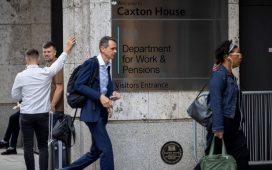And maybe – just maybe – she won’t. After all, she kept her Spring Statement promise of no tax rises.
Last week, Reeves suggested in The Daily Telegraph that no tax hikes were planned. Yet her reassurance was wrapped in hedges and evasions.
She ruled out a wealth tax, which isn’t viable anyway in my view, and claimed she had “got the balance right” after last autumn’s rise in capital gains tax (CGT).
After that, she got a bit vague.
Unfortunately for Reeves, economic reality is closing in fast. Britain’s deteriorating fiscal position is narrowing her options by the day.
The gap between what she promises and what reality demands is widening by the day.
Paul Johnson, director of the Institute for Fiscal Studies, has bluntly warned that Reeves may have no choice but to do the unthinkable: raise the basic rate of income tax for the first time in 50 years.
Incredibly, the last Chancellor to do that was Denis Healey, who in 1975 hiked the basic rate from 33% to 35%.
In those days, the top rate of tax was 83%, plus a 15% surcharge on investment income, lifting the total to an eye-watering 98% on the wealthiest.
Many on the left still dream of punitive tax rates like those, believing they’ll usher in a land of milk and honey.
Yet Healey’s Britain was an economic disaster zone, with soaring inflation, rising unemployment, a collapsing pound and endless strikes. Healey was ultimately forced to go cap in hand to the IMF.
Johnson points out that with growth forecasts almost certain to be downgraded, Reeves faces two options this autumn: borrow more or raise taxes.
With borrowing already “uncomfortably high”, she’ll have to hike taxes, Johnson says.
He also scoffs at Sir Keir Starmer’s claim that only those with the “broadest shoulders” will pay more, saying they already carry most of the burden.
“Lumping yet more taxes on high earners and companies,” Johnson warns, “will put at risk the growth the government claims to want to foster.”
Instead, he believes Reeves will have to target middle earners, including the growing army of pensioners who pay tax in retirement.
Others agree. The EY Item Club has warned that Donald Trump’s escalating trade wars could wipe out Reeves’s precious £9.9 billion of fiscal headroom.
EY’s chief economic adviser Matt Swannell said this “has only increased the chances that we may see a larger fiscal rethink in this year’s autumn Budget”.
The Budget is less than six months away. If Reeves does raise taxes, she will no doubt blame Trump.
But last week the IMF made it clear: most of the UK’s economic problems are largely homemade.
Worse, the tax hikes Reeves has already enacted are backfiring.
Take capital gains tax: receipts have dropped by more than £1billion, according to HMRC figures. Analysts point to an exodus of the wealthy, who mostly pay CGT.
The scrapping of the non-dom regime and higher CGT rates have driven entrepreneurs, investors and business owners to tax havens like Monaco and Milan.
The Livingstone brothers and top Goldman Sachs banker Richard Gnodde are just the latest high-profile names to flee.
Meanwhile, Reeves’s £25billion hike in national insurance contributions is throttling businesses and strangling job creation.
Events are slipping out of her control.
Unless there’s a miraculous turnaround, Reeves will soon face an unenviable choice: raise taxes, slash spending or abandon her “non-negotiable” fiscal rules. Or she could do all three.
Don’t listen to the Chancellor. The numbers tell a very different story.










